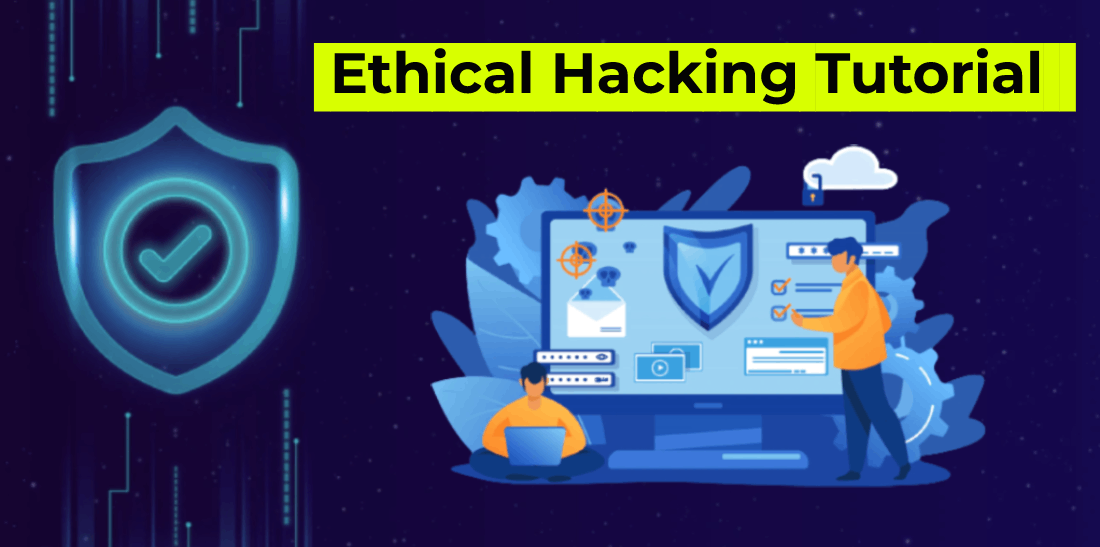Ethical Hacking Tutorial
Last Updated :
24 Nov, 2023
This Ethical Hacking tutorial covers both basic and advanced concepts of Ethical Hacking. Whether you are a beginner or an experienced cybersecurity professional, this tutorial is the perfect resource to learn how to tackle vulnerabilities and weaknesses in systems before malicious hackers can exploit them.
From understanding the hacking basics to diving into advanced ethical hacking techniques, including Footprinting and Reconnaissance, Scanning Networks, Enumeration, and more.
This ethical hacking tutorial covers everything you need to know to become a skilled ethical hacker and learn how to use your skills to find and fix vulnerabilities in systems before they can be exploited by malicious hackers. Let’s get started.

Ethical Hacking Tutorial
What is Ethical Hacking?
Ethical Hacking, also referred to as “white hat hacking,” “Pen Testing,” or simply “ethical hacking,” plays a critical role in maintaining the security and integrity of computer systems and networks. It involves cybersecurity practices that use hacking tools and techniques to identify vulnerabilities and weaknesses in computer systems and networks with the primary objective of preventing unauthorized access to systems and sensitive data, protecting against cyber-attacks, and ensuring the security of an organization’s assets.
Ethical Hacking Tutorial: Beginners to Advanced
Introduction to Ethical Hacking
Foot Printing and Reconnaissance
Scanning Networks
Enumeration
System Hacking
Malware Analysis
Sniffing
Social Engineering
Denial-of-Service
Session Hijacking
Evading IDS, Firewalls, and Honeypots
Hacking Web Servers
Hacking Web Applications
SQL Injection
Hacking Wireless Networks
Cloud Computing
Cryptography
Why is Ethical Hacking Important & Job Roles for Ethical Hackers?
Nowadays, Data is the most valuable asset for any corporation. In order to the preservation of privacy and Integrity of data from Malicious Attacks Ethical hacking is Important because it helps organizations identify and mitigate potential security risks, prevent cyber attacks, and improve overall security. Ethical hackers play a critical role in this process by identifying vulnerabilities, conducting penetration testing, and recommending solutions to improve security.
Roles of Ethical Hackers:-
- Identifies the Vulnerability of Computer Systems, networks and software applications.
- Simulates Cyber Attacks to Identify Weaknesses in Security Control and Systems.
- Ethical Hackers maintain documents of their findings, provide recommendations and Improve Overall Security.
- Ethical Hacker assists the organization to implement Security Policies and procedure to enhance overall Security.
- Ethical hackers also provide security training to other employees.
What are Security Threats and their types?
Any Activity that has the potential to harm a system and breach the security of the Organization.
Types of Security Threats:-
There are mainly two types of Security Threats:-
- Physical Threats – Physical threats are those that involve physical access to an organization’s assets.
- Internal e.g. hardware fire, faulty power supply, internal hardware failures etc
- External e.g. floods, fires, earthquakes etc
- Human e.g. vandalism, arson, accidental errors etc
- Non-Physical Threats – Non-physical threats include every threat that has no physical manifestation. They are also known as logical threats. Here are some of the most common types of security threats:
- Malware
- Phishing
- Denial of Service (DoS) attacks
- Insider threats
- Advanced Persistent Threats (APTs)
- Zero-day attacks
- Man-in-the-middle attacks
- Password attacks
Advantages of Ethical Hacking
Here are various advantages of hacking:-
- It is used to test how good security is on your network.
- It is used to recover the loss of information, especially when you lost your password.
- It is used to perform penetration testing to increase the security of the computer and network.
Ethical Hacking Tutorial: FAQs
Q1. What is Ethical Hacking?
Answer:
Ethical hacking, also known as “White Hat” hacking, is the practice of using computer skills to test and secure computer systems and networks. Ethical hackers use their skills to find and fix vulnerabilities and weaknesses in systems before they can be exploited by malicious hackers, also known as “black hat” hackers.
Q2. Is an Ethical hacking course tough?
Answer:
Ethical Hacking requires a high level of knowledge of operating systems, computer networking, and any programming language. Ethical hacking is not difficult to learn but requires great computer skills.
Q3. What is the Ethical Hacking certification cost?
Answer:
For taking CEH v12 exam in India, you need to pay around ₹45543 approx.
Q4. What is the salary of an ethical hacker?
Answer:
The average salary for an Ethical Hacker in India is ₹51,251 approx.
Like Article
Suggest improvement
Share your thoughts in the comments
Please Login to comment...